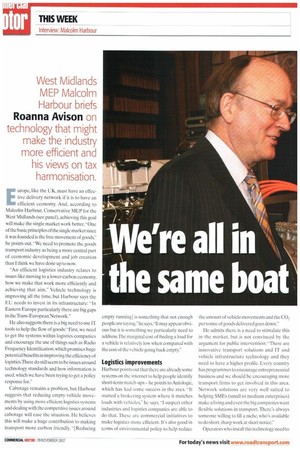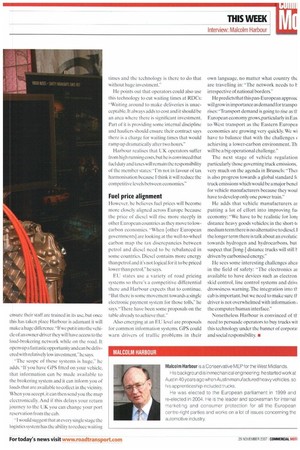West Midlands MEP Malcolm Harbour briefs Roanna Avison on technology
Page 28

Page 29

If you've noticed an error in this article please click here to report it so we can fix it.
that might make the industry more efficient and his views on tax harmonisation.
Europe, like the UK, must have an effective delivery network if it is to have an efficient economy. And, according to Malcolm Harbour, Conservative MEP for the West Midlands (see panel), achieving this goal will make the single market work better, "One of the basic principles of the single market since it was founded is the free movement of goods,he points out. "We need to promote the goods transport industry as being a more central part of economic development and job creation than I think we have done up to now.
"An efficient logistics industry relates to issues like moving to a lower-carbon economy, how we make that work more efficiently and achieving that aim." Vehicle technology is improving all the time, but Harbour says the EU needs to invest in its infrastructure: "In Eastern Europe particularly there are big gaps in the Trans-European Network."
He also suggests there is a big need to use IT tools to help the flow of goods: "First, we need to get the systems within logistics companies and encourage the use of things such as Radio Frequency Identification ,which promises huge potential benefits in improving the efficiency of logistics.There do still seem to be issues around technology standards and how information is used, which we have been trying to get a policy response for."
Cabotage remains a problem, hut Harbour suggests that reducing empty vehicle movements by using more efficient logistics systems and dealing with the competitive issues around cabotage will ease the situation. He believes this will make a huge contribution to making transport more carbon friendly. "[Reducing empty running] is something that not enough people are saying." he says."It may appear obvious but it is something we particularly need to address. The marginal cost of finding a load for a vehicle is relatively low when compared with the cost of the chicle going back empty."
Logistics improvements
Harbour points out that there are already some systems on the internet to help people identify short-term match-ups — he points to Autologic, which has had some success in the area. "It started a brokering system where it matches loads with vehicles," he says. "I suspect other industries and logistics companies are able to do that. These are commercial initiatives to make logistics more efficient. It's also good in terms of environmental policy to help reduce the amount of vehicle movements and the CO, per tonne of goods delivered goes down."
He admits there is a need to stimulate this in the market, but is not convinced by the argument for public intervention: "There are innovative transport solutions and IT and vehicle infrastructure technology and they need to have a higher profile. Every country has programmes to encourage entrepreneurial business and we should he encouraging more transport firms to get involved in this area. Network solutions are very well suited to helping SMEs (small to medium enterprises) make a living and even the big companies want flexible solutions in transport. There's always someone willing to fill a niche, who's available to do short, sharp work at short notice."
Operators who install this technology need to ensure their staff are trained in its use, but once this has taken place Harbour is adamant it will make a huge difference. "If N,ve put it into the vehicle of an owner-driver they will have access to the load-brokering network while on the road. It opens up a fantastic opportunity and can he delivered with relatively low investment," he says.
"The scope of these systems is huge," he adds. if you have GPS fitted on your vehicle, that information can be made available to the brokering system and it. can inform you of loads that are available to collect in the vicinity. When you accept, it can then send you the map electronically. And if this delays your return journey to the UK you can change your port reservation from the cab.
"I would suggest that at every single stage the logistics system has the ability to reduce waiting times and the technology is there to do that without huge investment."
He points out that operators could also use this technology to cut waiting times at RDCs: "Waiting around to make deliveries is unacceptable. It always adds to cost and it should be an area where there is significant investment. Part of it is providing some internal discipline and hauliers should ensure their contract says there is a charge for waiting times that would ramp up dramatically after two hours."
Harbour realises that UK operators suffer from high running costs, hut he is convinced that fuel duty and taxes will remain the responsibility of the member states: "I'm not in favour of tax harmonisation because I think it will reduce the competitive levels between economies."
Fuel price alignment
However, he believes fuel prices will become more closely aligned across Europe because the price of diesel will rise more steeply in other European countries as they move to lowcarbon economies. "When [other European governments] are looking at the well-to-wheel carbon map the tax discrepancies between petrol and diesel need to bc rebalanced in some countries. Diesel contains more energy than petrol and it's not logical for it to be priced lower than petrol," he says.
EU states use a variety of road pricing systems so there's a competitive differential there and Harbour expects that to continue. "But there is some movement towards a single electronic payment system for those tolls," he says. "There have been some proposals on the table already to achieve that."
Also emerging at an EU level are proposals for common information systems. GPS could warn drivers of traffic problems in their own language, no matter what country thc are travelling in: "The network needs to t irrespective of national borders."
He predicts that this pan-European approac will grow in importance as demand for transpo rises: "Transport demand is going to rise as tt. European economy grows,particularly in Eas to-West transport as the Eastern Europea economies are growing very quickly. We wi have to balance that with the challenges ( achieving a lower-carbon environment. Th will be a big operational challenge."
The next stage of vehicle regulation particularly those governing truck emissions, very much on the agenda in Brussels: "The' is also progress towards a global standard ft truck emissions which would be a major bendl for vehicle manufacturers because they woul have to develop only one power train."
He adds that vehicle manufacturers at putting a lot of effort into improving ful economy: "We have to be realistic for tom distance heavy goods vehicles; in the short-tc medium term there is no alternative to diesel.] the longer term there is talk about an evolutic towards hydrogen and hydrocarbons, but suspect that [long-] distance trucks will still t driven by carbonised energy."
He sees some interesting challenges ahea in the field of safety: "The electronics at available to have devices such as electron skid control, line control systems and drivt drowsiness warning. The integration into tt cab is important, but we need to make sure a driver is not overwhelmed with information ; the computer/human interface."
Nonetheless Harbour is convinced of tt need to persuade operators to buy trucks wil this technology under the banner of corporal and social responsibility. •






















































































































































































